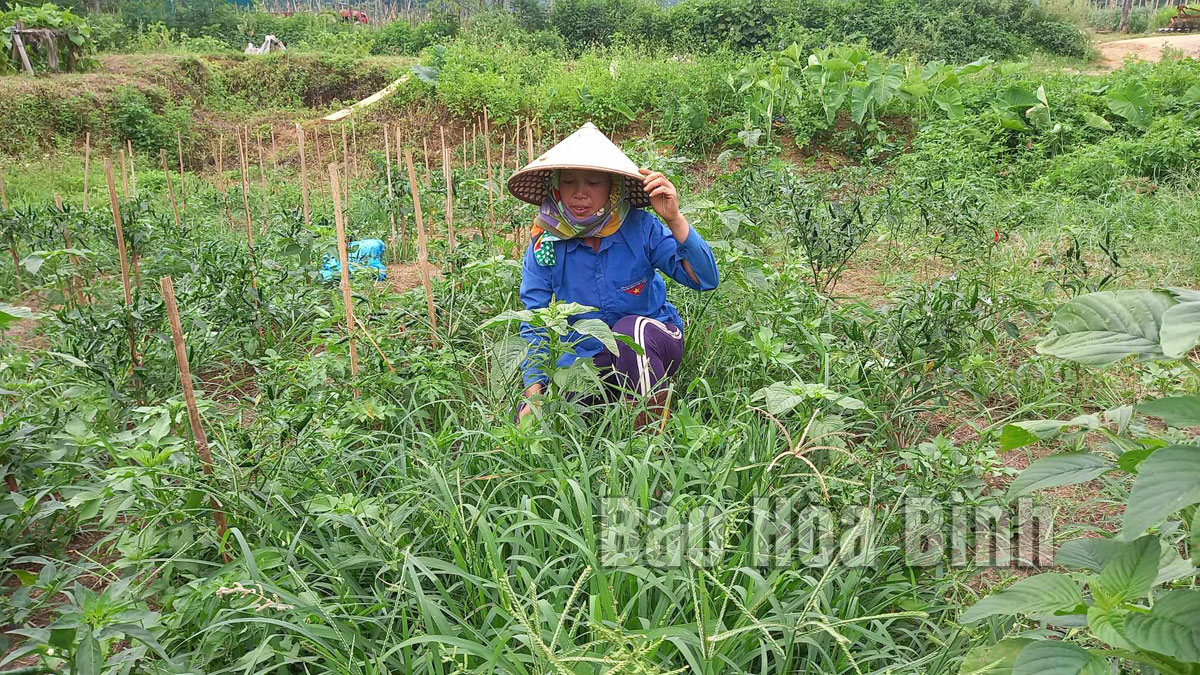
(HBO) – Quyet Chien, a mountainous commune in Tan Lac district and about 17km from the district downtown, has a total area of 2,000 hectares and a rough terrain with high rock mountains.
The long, narrow valley strip with small fields is the commune's major agricultural production hub, which accounts for about 11.4% of the commune’s total natural area, and the rest is mainly forest land with forest and bold rock mountains.
Bieng villagers of Quyet Chien commune in Tan Lac district have switched
inefficient rice farming areas into vegetable farms with higher economic
values.
Provincial Road 440, which crosses the commune, has brought advantages to the
locality in trading activities with neighbouring localities and regions.
Currently, the majority of the 266 households with 1,730 people in Quyet Chien
are living on agriculture.
Over the years, Quyet Chien has focused on implementing national target
programmes, especially the new-style rural area building scheme. It has
strengthened communications to encourage locals to transform the cultivation
structure in a suitable manner. At the same time, the commune has support local
residents in accessing capital from the Vietnam Bank for Social Policy to
invest in economic production.
Bui Van Hoang, a Bieng villager, said that his family has developed 2,500sq.m
of Korean white radish which has generated high economic values.
Hoang’s family is not the only in Quyet Chien to have successfully transformed
their inefficient farms into vegetable farms to provide products to Hanoi and
major cities across the country. Thanks to this solution, many have got out of
poverty. The average per capita income of the commune has reached 36.5 million
VND (1,509 USD). As a result, the rate of poor households in the locality has
been reduced to 18.3%.
Dinh Cong Khoa, Chairman of the provincial People’s Committee, said that the
commune is implementing three national target programmes, including the one on
boosting socio-economic growth in the ethnic minority-inhabited and mountainous
areas in the 2021-2030 period. It have covered all aspects of the social life,
creating positive impacts on these areas.
After two years of implementation, the programme has received positive response
from local residents, contributing to optimising potential and advantages of
the locality, boosting economic development, ensuring social welfare, improving
people’s incomes, and maintaining political stability, social order and safety
in the locality.
Hoa Binh province is undergoing a dynamic transformation amid Vietnam’s national digital transition. Building on Poliburo’s Resolution No. 57-NQ/TW on breakthroughs in science, technology, innovation, and national digital transformation, the province has rolled out a wide range of practical action plans. A standout initiative is the "Digital Literacy for All” movement, an effort to ensure that no one is left behind in the digital era.
Hoa Binh province is undergoing a dynamic transformation in the wake of the national digital transformation movement. Building on Resolution No. 57-NQ/TW of the Politburo on breakthroughs in science, technology, innovation, and national digital transformation, the province has implemented a wide range of practical action plans. A standout initiative is the "Digital Literacy for All” movement ambitious effort to ensure that no one is left behind in the digital age.
With a spirit of unity and proactive problem-solving, the Party Committee, the government and the people of Dong Lai Commune (Tan Lac District) have made great strides in implementing the resolutions of the 24th Party Congress of the commune for the 2020 - 2025 term. Focusing on leadership and practical actions, the commune has brought the Party’s resolutions into daily life, creating strong impacts and pushing the local development forward.
Amid the nationwide push for digital transformation, young people in Hoa Binh Province are stepping up as dynamic pioneers, applying technology to enhance Youth Union operations and expand the reach of youth-led initiatives. Through creativity and adaptability, Youth Union organizations at all levels have introduced a series of practical solutions, contributing to modern governance and community development.
In recent years, An Nghia commune, located in Lac Son district, has stepped up administrative reform, focusing on improving the quality and efficiency of its single-window service unit for receiving and processing administrative procedures. These improvements have helped create favourable conditions for local residents and organisations to handle administrative procedures, contributing to the commune’s broader socio-economic development.
The Prime Minister-approved master plan to develop the multi-use value of forests ecosystems through 2030, with a vision to 2050, aims to improve the management and sustainable use of forest resources, create jobs, increase incomes, and improve the living standards of ethnic minorities, people in mountainous and remote areas, forest workers and those living near forests.



